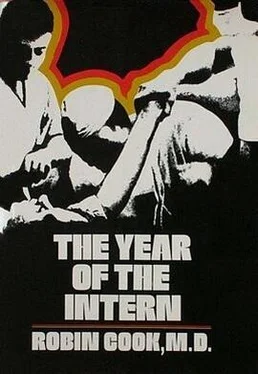One thing had stayed with me, even grown stronger, over the past ten months — the satisfaction in achieving a quick, desired result — and I felt relieved when I evacuated a large quantity of fluid and air from the patient’s stomach. My relief was minimal, however, compared to his. He was still having some troubles, but his breathing was much easier. When he thanked me very much, it took him two breaths to get the phrase out. I listened to his lungs again, just to make sure that there wasn’t any fluid in them. They were clear. His legs were normal, too, showing neither edema nor any suggestion of thrombophlebitis. Peeking under the dressing, I thought his incision looked fine, without excessive drainage. I told the nurse to get a suction machine for the NG tube and hook it up, while I went back to the nurses’ station with the EKG.
I was still pretty shaky at reading EKG’s, but his looked okay to me. At least, there were no arrhythmias. Possibly there was some slight suggestion of right heart strain with the S wave, but nothing drastic. As a precautionary measure, I decided to call the medical resident for support on the EKG reading. After a rather awkward minute or so during which I explained the situation and the resident listened, he finally said he wouldn’t come down to see the EKG because it involved a private surgical patient.
I could understand his reluctance. It resembled mine when the medical intern on duty called me at night for help with a cutdown or something else on a private medical patient. Had the attendings made us feel it was a matter of reciprocal co-operation, each fellow holding up his end, those nasty little jobs would have been easier to take. But in American medicine, much of the difference between an intern and a full-fledged doctor is literally the difference between night and day. They would let us do virtually anything at all after the sun went down, when teaching was nonexistent, but nothing during the day, when we might learn something. As always, a few pleasant exceptions proved the rule — but damn few.
Early in my internship, I had been rather naïve about this master-slave relationship, knowing nothing of my rights. Until it wore me out, I tried to see every patient, private or charity, on the teaching service or not, no matter how minor the complaint. Finally, however, it was a question of my survival. Nowadays, whenever I got called at night for some routine matter concerning a private patient — a temperature elevation, for instance — I always asked the name of the doctor. If he was on the wrong side of the answer — and most of them were — I told the nurse to call him back and say that interns are not required to see private cases except in emergencies. This was not true, of course, for private cases on the teaching service. Then I had to go no matter who the doctor was.
Doctors of middle age or older were fond of making invidious comparisons between our supposedly soft life and their Spartan days way back when. To hear them tell it, thirty years ago an intern lived well below the poverty line. Our sumptuous salaries, which I reckoned to be about half what was paid to a plumber’s assistant, simply enraged them. What is the world coming to? they would say. Why, we had to do workups on every patient, no matter what his status, and we never slept, and we didn’t have all these fancy machines, and so forth and so on. Their attitude toward us was a simple matter of venom: they had suffered, and so would we. Thus does medical education in this enlightened time creep from generation to generation; each takes its sweet revenge.
Where was the patient in all this? Caught right in the middle — a most uncomfortable place, with the shells and bombs of medical warfare landing all around him.
Curiously, most of the legislation corning out of Washington was only making the situation worse. The thrust was very strongly toward providing more and more private care at government expense, but without any attempt either to control the quality of the medical care or to educate the potential patient. Suddenly armed with dollar power, previously indigent patients were being thrust on the medical market with no notion whatsoever of how to choose a doctor, and somehow, as if by mischievous grand design, they seemed to flock toward those marginally competent M.D.’s whose practice depended on volume, not quality. The immediate result was that the kinds of patients whom the interns and residents used to care for were now appearing on the private floors under the tender care of doctors who, like the Supercharger, did not know how to treat, let alone teach. Even old Roso had appeared again, for some minor complaint, under the care of a. private physician who didn’t want the house staff nosing in the chart. Left stranded by the tide of money, the interns were forced into the clutches of these archaic doctors in order to gain experience in dealing with certain types of cases. Everybody suffered. In years past, when these patients were admitted on the staff service, they were taken care of with the help of the best specialists around. It would turn out, logically, that the most capable and knowledgeable attendings were also on the staff teaching service, because the hospital teaching committee and the house staff selected the best they could get. And the attendings who were most interested in teaching were almost invariably the most knowledgeable. If ever I was called at night to see one of their patients, I went, no matter what the reason.
But now, instead of being admitted on the staff service, where they were invaluable for teaching purposes and at the same time got better medical attention than anybody else in the hospital, these former staff patients were all flocking to the Neanderthals. How could something as vital as medical education and care get so screwed up? It seemed especially scary to me in respect to surgery, and it certainly made the English, the Swedes, and the Germans seem enlightened. They allow only specialists to operate in their hospitals. In the United States, any screwball with a medical diploma can perform any kind of surgery he wants to, as long as the hospital allows it. I knew how inadequate my medical-school training had been with respect to patient care; yet I also knew that I could get a license to practice medicine and surgery in any of the fifty states. What is it in the American psyche that allows us to spend billions policing the globe and yet makes us willing to put up with a criminally backward medical system? Like every other important question during my internship, this one was finally pushed aside by exhaustion. I began to accept the situation as if there were no alternative. In fact, there is no alternative at present. Now the problem only popped into my head when trouble was brewing, and I knew I would have plenty of trouble with the Supercharger over those X rays and other tests I had ordered on his hernia repair. I wondered again why I didn’t go into research.
Before I called Supercharger and woke him up, I wanted a look at the X ray that had been taken on the portable machine. He’d probably explode when he found out about it in the morning, but I couldn’t have cared less.
The hall got darker and darker as I retraced my steps and plodded through the hospital labyrinth on my way to X-ray. It was so silent and dark when I got there that I could not find the technician. Finally, in desperation, I picked up a telephone and dialed one of the numbers of the X-ray department. All around me, about a dozen phones came to life. Someplace, somebody answered one, silencing the others. I told the speaker that I was in his department and wanted to see a portable he had taken only an hour or so ago, whereupon he appeared through a door not ten feet away, blinking and tucking in his shirt. I followed him to a bunch of view boxes, waiting while he sifted through a stack of negatives.
Читать дальше












